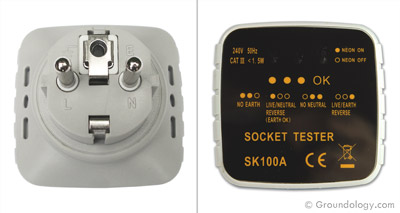Using UK electric appliances in Bulgaria
If I want to use my UK electrical appliances in Bulgaria, will a basic electrical plug socket travel adapter be sufficient, or is there a more sturdy plug adaptor available intended for longer term / permanent / fixed use?
I'm thinking of - kettle, PC, HIFI system, TV, vacuum cleaner etc.
Cheers.
To be quite frank with you Lee, I would buy new appliances when you arrive. Maybe the kettle so you have a brew when you arrive but that's it.
Hi Lee4, we’re using quite a few things with English plugs - computer, electric toothbrushes, speakers, food processor, coffee grinder - I can think of off the top of my head. We just use standard adapters, some we brought from England and some we’ve bought here. When are you thinking of moving out?
Lee4 wrote:If I want to use my UK electrical appliances in Bulgaria, will a basic electrical plug socket travel adapter be sufficient, or is there a more sturdy plug adaptor available intended for longer term / permanent / fixed use?
I'm thinking of - kettle, PC, HIFI system, TV, vacuum cleaner etc.
Cheers.
Voltage - Close enough not to matter
Frequency - Same so things with clocks will work
Socket type - European 2 pin things - Inferior to UK style but they work (No fuses)
Adaptors will work but high power devices like the kettle and vacuum will need good quality ones, or you could simply cut off the plugs and change them for local ones.
The kettle is just buy a new lead.
Hi again.
It's really only high-voltage equipment that you need to consider the quality of the adapter; my advice would be to swap the UK plug for a European earthed version.
One thing to watch out for; in my experience, not all wall-plugs are earthed, that's not an issue unless you have equipment that needs earth, many don't.
Hope this helps.
Cynic
Expat Team
"One thing to watch out for; in my experience, not all wall-plugs are earthed, that's not an issue unless you have equipment that needs earth, many don't."
What are a few examples of electrical appliances/equipment that need to be earthed?
Thanks.
From my house right now:
No Earth - TV, Computer, wireless speakers, multiple lights, telephone answer machine, various USB chargers for phone, Ipad
Earthed - extension leads, steam iron, fridge/freezer, washing machine, tumble-dryer, power tools.
It's easy to see, open the plug and look for the green/yellow earth wire.
Lee4 wrote:"One thing to watch out for; in my experience, not all wall-plugs are earthed, that's not an issue unless you have equipment that needs earth, many don't."
What are a few examples of electrical appliances/equipment that need to be earthed?
Thanks.
Rough rule of thumb - If it has a metal case or exposed metal parts such as an iron.
So although UK plugs have 3 pins, and Bulgarian plugs 2 pins, some UK appliances only have two wires inside the cable and not 3, with the third wire been the green/yellow earth wire?
Lee4 wrote:So although UK plugs have 3 pins, and Bulgarian plugs 2 pins, some UK appliances only have two wires inside the cable and not 3, with the third wire been the green/yellow earth wire?
Bulgarian plugs also have three connectors, but the earth is a pair of metal slides on the side of the plug, not a pin.
Not all appliances require an earth, but some do.
The rule is easy - If it has three wires, use them.
Fred wrote:Lee4 wrote:So although UK plugs have 3 pins, and Bulgarian plugs 2 pins, some UK appliances only have two wires inside the cable and not 3, with the third wire been the green/yellow earth wire?
Bulgarian plugs also have three connectors, but the earth is a pair of metal slides on the side of the plug, not a pin.
Not all appliances require an earth, but some do.
The rule is easy - If it has three wires, use them.
Thanks Fred
Useful info https://world-power-plugs.com/bulgaria
Cynic wrote:Hi again.
It's really only high-voltage equipment that you need to consider the quality of the adapter; my advice would be to swap the UK plug for a European earthed version.
One thing to watch out for; in my experience, not all wall-plugs are earthed, that's not an issue unless you have equipment that needs earth, many don't.
Hope this helps.
Cynic
Expat Team
Hi Cynic
How does a person discover / test for if a wall plug socket is earthed? By taking off the face plate and looking for a yellow and green wire?
Are wall plug sockets meant to be earthed in Bulgaria?
Thanks.
Quick, safe, and cheap
https://www.groundology.co.uk/earthing/accessories
"High voltage equipment", Cynic? Are you thinking of three-phase equipment or confusing voltage with wattage?
Domestic equipment all runs on 220/240 volts, unless it has its own "power brick" PSU, which likewise runs at 220/240 and supplies the requisite AC or DC voltage and current.
By and large, you can get away with, in ascending order of "desirability":
- using a "proper" UK-to-Shuko adapter - you can buy decent ones here rated at 16 amps, DON'T use a travel one as they're often low-quality and low-rated. Make sure you have a good supply of fuses, though - you'll be hard-pressed to find any here!
- replacing the UK plug with a Shuko (ie round-pin) one. Most low-wattage (and many high-wattage) domestic appliances are double-insulated these days, so don't have a separate earth connection anyway. The important drawback of Shuko is that it's easy to reverse the polarity of the supply, as you can normally put the plug in either way round; with modern equipment that usually doesn't make any difference. Things like computers and kettles often have separate leads which you can just buy replacements for here.
Neither of the above will address the issue of a missing/dodgy earth connection, if that connection is needed (you can usually tell because most double-insulated UK appliances will have a plug with an all-plastic earth prong).
The third, and arguably best, option is to have some UK sockets installed. You'll still need to keep a supply of fuses handy for the appliances but UK sockets are definitely superior if you buy decent ones - don't risk your life to save a few bob here! There's obviously no way you can insert a UK plug upside-down.
Many older properties here don't have an earth connection per se, which shocks some people ((if you'll pardon the pun  ) but isn't as bad as it sounds: it usually means that the "earth" connection is bonded to neutral, which functions perfectly well, albeit not ideally. It certainly isn't as good as having a separate earth connection in your own installation, ie a ground spike literally in the ground, but is actually quite similar to what you really get in the UK, where the "earth" connection arriving at your home comes from a sub-station where it's usually neutral-bonded anyway.
) but isn't as bad as it sounds: it usually means that the "earth" connection is bonded to neutral, which functions perfectly well, albeit not ideally. It certainly isn't as good as having a separate earth connection in your own installation, ie a ground spike literally in the ground, but is actually quite similar to what you really get in the UK, where the "earth" connection arriving at your home comes from a sub-station where it's usually neutral-bonded anyway.
If you have any electrical (or indeed any) work done here, be sure to check double-check who's doing it and what their qualifications are - there are MANY cowboys here and by no means all of them are locals. Keep in mind that recommendations can be good but don't always come from folk who actually know what a good job looks like! If I had a pound for every real expert I've come across here, I'd still be a very poor man!
The above isn't an exhaustive discussion of all the issues you might encounter with electricity here and there are elements which can be viewed/approached in other ways but you won't go far wrong if you bear the points in mind.
JimJ wrote:The third, and arguably best, option is to have some UK sockets installed..
Or, if you want easy and cheap, bring a few 4 gang mains sockets and bung a European plug on them.
That "easy and cheap" doesn't address the problem of being able to plug Shuko in either way round... 
It's okay for double-insulated kit, which usually works regardless of which side's positive, or if you need a UK extension lead anyway but it can pose a problem if it's essential to get it the right way round. You also need to keep a bigger stock of fuses, since the extension socket also needs one. Even decent wall sockets aren't expensive, so it's worth doing the job properly, in my view. I can't speak for anyone else but my life's worth more to me than the prospect of saving a few quid!
Lee4 wrote:Cynic wrote:Hi again.
It's really only high-voltage equipment that you need to consider the quality of the adapter; my advice would be to swap the UK plug for a European earthed version.
One thing to watch out for; in my experience, not all wall-plugs are earthed, that's not an issue unless you have equipment that needs earth, many don't.
Hope this helps.
Cynic
Expat Team
Hi Cynic
How does a person discover / test for if a wall plug socket is earthed? By taking off the face plate and looking for a yellow and green wire?
Are wall plug sockets meant to be earthed in Bulgaria?
Thanks.
Hi again:
You can tell by looking:
European unearthed socket (Type C socket):
European earthed socket (Type F socket):
I have no idea if wall plug sockets are meant to be earthed in Bulgaria.
Hope this helps.
Cynic
Expat Team
JimJ wrote:. I can't speak for anyone else but my life's worth more to me than the prospect of saving a few quid!
Ask this - Are Bulgarian hospitals and graveyards full of people that were electrocuted by putting plugs in upside down that are designed to be put in either way and still operate safely?
If not, why get worried?
Come to think of it, loads of other countries use the same system, including Indonesia where I'm using this same type all over the house without the slightest issue, but we don't have carts being pulled around with people shouting, "Bring out your dead".
Frankly, it's a bit pointless worrying about trivia, especially when your premise is flawed.
JimJ wrote:That "easy and cheap" doesn't address the problem of being able to plug Shuko in either way round...
Perhaps you can explain what the problem actually is.
I've no idea which "flawed premise" you're talking about but perhaps you might care to read what I wrote before making comments?
I was referring to the possibility of something which may malfunction if the correctly polarity is not observed - which is close to impossible in the UK system, barring incorrect mains wiring. I did make the point that "with modern equipment that usually doesn't make any difference", certainly as far as domestic appliances are concerned but no-one knows what might be plugged in at some point in the future.
The most important point, however, is that messing about with electricity and making light of the dangers involved is a fool's game. Even in the supposedly-safe UK, people still die as a result of electrical fires and electrocution. If you want to introduce levity into the discussion, feel free but, as I said, my life is worth enough to me to spend the extra amount to make things as safe as possible: what yours is worth is a matter between you and your Maker.... 
JimJ wrote:I was referring to the possibility of something which may malfunction if the correctly polarity is not observed - which is close to impossible in the UK system, barring incorrect mains wiring.
Perhaps you could give an example of something that has experienced such an issue, and an estimate of how many people have been injured or died as a result.
Obviously not a one off or when someone has messed with the wiring, but what can and has actually happened when a two way plug that is designed to work either way, with equipment that is designed to work with that system, has been plugged in the wrong way.
You'll have to excuse me but I really see no point in prolonging this rather pointless "discussion". If you're unable, or unwilling, to grasp that certain electrical equipment requires correct polarity - larger UPSs (as used for back-up of wood-fired CH in Bulgaria) are one example - or that safety is a serious topic then this is clearly just a waste of everyone's time.
In 2015/16 there were 15,432 electrical fires (54.4% of all fires) in England, causing 1,380 fatalities and injuries. There is no breakdown of exactly what went wrong and of course old wiring installations undoubtedly played their part, as did dodgy connections. Things in Bulgaria are rather more slapdash, so safety needs to be of greater concern.
The whole point is that there's a "right" way to try to safeguard your life and property and then there's the "bung on this and chop off that" way. I have no objection to you choosing the second, as long as the results don't impact anyone else. However, one can't be too careful, or plain gung-ho, with electrical safety - to say nothing of trying to explain to an insurance company what when wrong when local regulations and elementary precautions weren't adhered to.
Have a nice time wherever in the world you're currently living - and try not to suck on any live cables... 
Lee4 wrote:I'm thinking of - kettle, PC, HIFI system, TV, vacuum cleaner etc.
As the thread has gone a little of course with a load of old round things men tend to play with in their pockets, perhaps I can simplify.
Kettle - Buy a new lead when you arrive
HiFi - Take whatever adaptor you need and a UK four gang (or however many sockets you need if it's a stacker of whatever sort). It'll work fine.
TV - New plug or four gang so you can plug in a DVD or whatever, just use an adaptor or change the plug on the lead. Not enough power to worry about unless it's an old cathode ray job, in which case you should toss it anyway
Hoover - This is the only one I'd have any reservations about as they have moulded plugs in the UK for safety, and the plugs you'll find in Bulgaria won't take the same hammer as a moulded UK 3 pin, a serious consideration when you think of the number of times the wires get pulled when you're using it.
Cheap, flog it and buy a new one when you arrive. You could use a better quality adaptor, but I'm unsure it's worth the trouble.
Mobile phones/computer/whatever other small electronics - Back to the four way with a local plug stuffed on the end of the lead or an adaptor - But make sure it's unlocked to any network or your new SIM card won't work
As for plugging any of the above in the wrong way - Forget it - Nothing to worry about
Washing machine - These are high power units (if it heats the water), so a change of plug is best for the job, but it really needs an earthed socket so get hold of the tester I mentioned earlier. Personally, I'd scrap it and buy a new one as carrying such a large item would be a pain in the bum.
JimJ wrote:If you're unable, or unwilling, to grasp that certain electrical equipment requires correct polarity
Such as?
JimJ wrote:In 2015/16 there were 15,432 electrical fires (54.4% of all fires) in England, causing 1,380 fatalities and injuries.
Is England in Bulgaria? If now, what has that got to do with the price of fish?
I requested your figures as to how many people were hurt because equipment was plugged in the wrong way round, but you seem to have misunderstood my post
Fred wrote:JimJ wrote:The third, and arguably best, option is to have some UK sockets installed..
Or, if you want easy and cheap, bring a few 4 gang mains sockets and bung a European plug on them.
https://www.lindy.co.uk/images/uk-mains … medium.jpg
And a surge protected gang socket should be best. They do work. I bought a new computer many years back and within months it had fried itself due to no surge protection plugging it directly into the wall. Luckily the manufacturer was good enough to replace it for free under a one year guarantee and recommended surge protection power strips, which I have since then used all around the house. Have since then burnt out just one surge protection power strip but it saved the computer etc attached to it.
A washer repair man who came to my house told me that - technically such (13 amp) gang sockets are still only designed for running one appliance at a time, not all four at once. I don't know, I have very limited knowledge of electrician stuff and am here to learn.
I do have a UK earth live mains tester, a European one would be needed. Would this work on all EU 2 pin plugs (including type C E F)?
UK multi gang sockets tend to be pretty safe up to the stated power rating, that never exceeding 13 amps total.
Small items such as stereos, TVs, or whatever present no problems at all.
These plugs in Bulgaria are poorer in many ways, and there might well be quality issues with them if regulations are lax.
We use the same type here, and quality varies a lot.
Fred wrote:UK multi gang sockets tend to be pretty safe up to the stated power rating, that never exceeding 13 amps total.
Small items such as stereos, TVs, or whatever present no problems at all.
These plugs in Bulgaria are poorer in many ways, and there might well be quality issues with them if regulations are lax.
We use the same type here, and quality varies a lot.
Yes I think thats what the washer repair man said. Cos I have a plug in 13 amp surge protected 4 gang extension strip in my kitchen, with a kettle, mini hob and blender plugged into it. What he meant was its only safe for me to use one of these appliances at a time.
Lee4 wrote:Fred wrote:UK multi gang sockets tend to be pretty safe up to the stated power rating, that never exceeding 13 amps total.
Small items such as stereos, TVs, or whatever present no problems at all.
These plugs in Bulgaria are poorer in many ways, and there might well be quality issues with them if regulations are lax.
We use the same type here, and quality varies a lot.
Yes I think thats what the washer repair man said. Cos I have a plug in 13 amp surge protected 4 gang extension strip in my kitchen, with a kettle, mini hob and blender plugged into it. What he meant was its only safe for me to use one of these appliances at a time.
With that list, very probably.
No point having the surge protection on those items as they'd have no problem with an extra volt or 20 for several minutes.
Computers should also be able to take a quick spike, but I use a UPS with mine as the mains is prone to cutting off without warning.
If your house, or Bulgaria in general, has a lot of power cuts, a UPS is a good buy. You can also use it to charge phones and so on if your leccy is dodgy, but only with low power items, never the kettle.
Yes I've got a UPS, but the battery died and needs replacing. They cost about £12 on ebay.
Would a UK surge protector socket gang strip work with the Bulgarian electrical frequencies?
With a surge protector one only knows if it worked after the electrical surge which caused it to stop working.
Years back when my surge protector stopped working after presumably protecting my 2nd PC from an electrical surge, I threw the surge protector away thinking it had done its job and was now spent.
I never thought to try changing the surge protectors plugs fuse which may have been all that had been blown in protecting my PC from the electric surge/spike. (??)
The surge protector looked okay after it had stopped working. In fact how do I even know it had done its job and protected the PC from an electrical surge, maybe the SP's plugs fuse had just blown......
Most stuff simply doesn't need a surge protector, especially kettles and anything with a motor.
I'd stick with the UPS for the computer, and not bother for everything else.
Electricity here in Indonesia is variable, but nothing has ever died due to the dodgy supply.
If your house supply was updated in the last 4-5 years, the chances are that the sockets are earthed, (if rewired by a competent train electrician working to code), if your wiring is much older than that, it's probably not earthed.
Check your appliances for voltage and frequency, a lot of older UK equipment is 60Hz, but more modern things are 50-60 Hz.
I was looking at stand mixers last week, and went with a 50-60 Hz unit, rather than the top suggested 60 Hz, as the one I bought was the second pick on the list, and the price and majority of other features were identical, I don't see it as a problem.
The reasons to buy in the UK IMO, 1) price, the mixer mentioned above is around £80 in the UK, at Technopolis in BG, a mixer with less functionality, smaller bowl, etc was around 430 leva, or £191.81 (@ todays exchange rate). 2) Choice, Technopolis has 1 stand mixer, Amazon, Curry's etc have dozens.
@JimJ Hello. I'm late to this discussion but keen to know more about the option of installing UK sockets in my home. I've read the electrical system is essentially the same - 230 V, 50 Hz - but is there anything else to bear in mind?
@leedigings2
Yeah, this thread has definitely been gathering cobwebs for a few years. :-) You're probably better off starting a shiny new thread with your questions.
I wouldn't personally install UK sockets, it seems like an unnecessary complication. I have quite a few UK appliances that I brought over, but I either use one of my adapters, or I cut off the old UK plug and rewire with a BG plug.
@Lee4
No problem whatsoever..its what i have been using for over 20 years.
Best bet for living room is..an extension
With a 2 pin ( adapted ) and use your 13 amp plug into that..saves buying many adapters....depends where the sockets are.
I got a big screen..computer..ext speakers..rent tv shows..and also plug into my smart tv my Netflix..You Tube
Etc.. the tv progs are around 30 lev a month via.SCAT cable..can also get some english progs..american etc..mostly at night..animal planet CSI
etc.
Good luck.
@Lee4
Hi
Aim to change your plugs to EU 2 pin .. travel adaptors are for short term use and not as robust as UK plugs.. the more you use them the more chance of wear and then arcing causes heat and then things start melting .. iv had it happen..
There easy to change
@leedigings2 I live in France and apart from the appliances I've had to replace, most of my electrical stuff has English plugs. I just brought a few UK trailing sockets and changed the plug to French. Make sure you bring fuses as well. The trailing sockets take 10amp, so I brought quite a few and the usual 3 and 13amp.
Make your relocation easier with the Bulgaria expat guide

Giving Birth In Bulgaria
If you find yourself pregnant in Bulgaria, you may be wondering if you will have to head home to have your baby. ...

Internship in Bulgaria
Looking for an internship in Bulgaria? Find information on the related conditions and procedures in this article.

Opening a bank account in Bulgaria
Do you wish to open a bank account in Bulgaria? Find out how to proceed in this article.

Taxes in Bulgaria
Do you have to pay taxes in Bulgaria? How to proceed and what are the conditions attached? Find out in this ...

Education in Bulgaria
Educational Structures and Background:

Accommodation in Plovdiv
Plovdiv is a very popular city with expatriates, more particularly with students. Find out how to find ...

Work in Bulgaria
Find, in this article, an overview of the Bulgarian labor market and tips to help you find a job if you intend to ...

Accommodation in Bulgaria
Looking forward to settle in Bulgaria? Find out in this article how to proceed to find accommodation in the ...
Forum topics on living in Bulgaria



